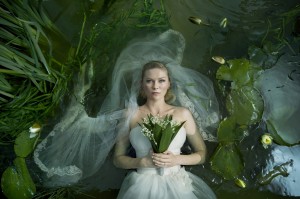NY Film Festival: ‘Melancholia’ is an entrancing fable from Lars von Trier

Lars von Trier made headlines at the Cannes Film Festival for his controversial comments on Nazi Germany. Much of the media spotlight was pulled away from his breathtakingly moving film, Melancholia, which will play the New York Film Festival and also hit movie theaters in November.
Melancholia stars an exquisite Kirsten Dunst as Justine, a depressed bride who can’t find the energy to attend her own wedding. She would much rather dawdle behind the scenes, taking a bath, playing with her nephew or petting her horses. Naturally, this irks her sister, Claire (an equally exquisite Charlotte Gainsbourg) and her husband, John (Kiefer Sutherland), who paid for the castle wedding with no expense spared.
Although the wedding should be a joyous occasion, it doesn’t take too long to figure out some of the reasons behind Justine’s melancholic state. Her new husband, Michael (Alexander Skarsgård), is likable and conciliating, but the rest of her family is an odd bunch. Charlotte Rampling plays Justine’s mother, Gaby, a pursed-lip wolf in sheep’s clothing who can’t stand the formalities of the wedding atmosphere. John Hurt plays Dexter, Gaby’s ex-husband and father to the bride. He’s the polar opposite to Rampling’s character — a free spirit who enjoys as many women as he can. He gets a kick out of counting his chorus of girlfriends, who literally hang off his arms like pariah.
Justine’s work situation is similarly unsatisfying. Her boss, Jack (Stellan Skarsgård), announces at the wedding that the new bride has been promoted to creative director of his ad agency. The vertical jump doesn’t change Justine’s feelings toward her boss and his manipulative ways.
All of this wedding (anti-)bliss comes in the first part of the film, simply titled “Justine.” The climatic second half, titled “Claire,” is a much drearier counterpart. Justine’s depression has escalated to the point where she’s unable to even wash herself in the bathtub. Her husband has left her (thanks to Justine’s quick shag with a wedding guest on the back lawn of the castle grounds), and she quit her job. She has reverted to a childlike state, with her sister and brother-in-law taking care of her every move.
Oh, and the world is ending.
Melancholia, at first, appears to be the name of Justine’s present emotional state. However, it actually refers to a planet that is on a crash course for Earth. It hovers in the sky during Justine’s wedding, but it’s never specifically detailed until the second part of the film.
Sutherland’s character is an astronomer who reassures the family that there is nothing to worry about. Melancholia will come close to Earth, but won’t actually make contact. Claire has her doubts and starts preparations for the apocalypse.
Von Trier is a unique filmmaker who has had a monumental effect on recent cinema. From Dogville with Nicole Kidman to Dancer in the Dark with Bjork, he is able to winningly write diverse female roles, much like Pedro Almodóvar has done in Spain. Dunst and Gainsbourg, who are both revelations, offer fully realized portraits of two women unable to connect and find solace. Every smile is forced; every laugh is fake. They cloak themselves in an unwanted negativity.
Much of the supporting work is stellar as well, especially from Sutherland, who remains the calm voice in this wayward family.
Melancholia is one of von Trier’s strongest features, albeit one of his most frustrating.
However, the frustration comes from its richness. So much is going on throughout the movie, but it’s all held together with lush cinematography, effective performances and an invigorating plot. Obviously, the science-fiction elements of the story are meant to be allegorical, but von Trier plays them straight. When Justine and Claire realize the end is near, they don’t escape into some phantasmagorical state of being. They do what is expected of them: They take Claire’s son and try to find proper shelter.
Coupling this apocalyptic storyline with Justine’s unhinged depression instantly couples the two narrative threads. As our main character unfolds before our eyes, Melancholia draws nearer. The connection between the blonde woman and the planet in the sky is made clear in one beautiful scene when Justine lies naked near a stream under the blue glow of her pending doom.
For some, Melancholia will be too avant garde to enjoy. It’s strange, to be sure, but it’s also much more accessible than most von Trier films. Although it’s a much different affair compared to his last effort, Antichrist, there are similarities in humanity’s connection with nature, the inability to make ourselves happy and the constant search for satisifaction.
It takes a planetary collision to realize what ails us.
By John Soltes / Publisher / John@HollywoodSoapbox.com-
Melancholia
-
2011
-
Written and directed by Lars von Trier
-
Starring Kirsten Dunst, Charlotte Gainsbourg, Alexander Skarsgård, Kiefer Sutherland, Stellan Skarsgård, Charlotte Rampling and John Hurt
-
Running time: 136 minutes
-
Rated R for some graphic nudity, sexual content and language
-
Rating:




-
Click here for more information on the New York Film Festival, where Melancholia will be featured.


Here’s another take:
“Melancholiais a true highlight”
http://culturecatch.com/film/melancholia